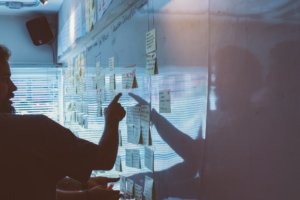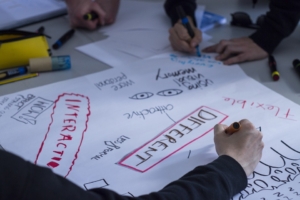Preventing Burnout in Today’s Environment
By Dana Borowka, MA, CEO of Lighthouse Consulting Services, LLC
Could employee burnout impact your company?
Burnout that causes companies to lose great employees occurs when your workers experience too much stress for a prolonged period. The employee is left feeling mentally, emotionally, and physically exhausted. Not only that, your employees are less productive at work, show reduced concern for others, and are more likely to miss work.

by dasstudios
Burnout is no doubt tied to stress, and workers in the United States are some of the most stressed employees in the world. That’s according to the 2022 Gallup State of the Global Workplace report, which captures how people are feeling about work and their life.
Surprising statistic: U.S. and Canadian workers, whose survey data are combined in Gallup’s research, ranked highest for daily stress levels of all groups surveyed. Some 57% of U.S. and Canadian workers reported feeling stress on a daily basis, up by eight percentage points from the year prior and compared with 43% of people who feel that way globally, according to Gallup’s 2021 report.
Too much stress at work and home leads to burnout, which can be defined as lower psychological and physical wellbeing, as well as dissatisfaction, and employee turnover.
This stress spike isn’t surprising to Jim Harter, Gallup’s chief workplace scientist, who told CNBC that “rates of daily stress, worry, sadness and anger have been trending upward for American workers since 2009. Concerns over the virus, sickness, financial insecurity and racial trauma all contributed to added stress during the pandemic.”

by Pexels
There is also a side effect called “quiet quitting.”
According to the newsletter The Daily Skimm, quiet quitting is “when employees quit going above and beyond what they’re paid to do. The pandemic blurred the lines between home and work — leading to burnout. And many have felt stretched thin by doing more than one person’s job, especially during The Great Resignation. On top of that, employees have become frustrated with the lack of growth opportunities and little pay.”
Quiet quitters are still doing their jobs, but common side effects of quiet quitting include: no more staying late after work, no more attending events like virtual lunches, and no more doing anything beyond the job description.
How To Spot Burnout
“Burnout looks like extreme exhaustion paired with low engagement, high hopelessness, poor motivation and limited efficacy,” says Colorado therapist Carrie Johansson, PhD, author of the book Self Help On The Go.
Helping companies prevent employee burnout is a critical element to employee retention and performance, says Johansson.
“Balancing challenge with breaks, prioritizing values and purpose in work, and encouraging employee autonomy all help keep employees engaged and motivated to perform,” says Johansson. “Employees should be encouraged to use cycles of effort interspersed with rest, to have systematic self-care strategies in place and to connect with fellow employees to stay actively engaged and connected in their work.”
Doug Clute takes a pragmatic view of burnout. Clute is a human capital consultant who provides Lighthouse Consulting Services clients with his insight accumulated in over 30 years as a human capital management executive within four different industries on an international scale.
“Typically, there is a bit of cynicism on the part of the employee when they’re experiencing burnout,” says Clute. “The employee’s mindset is: ‘I’m working so hard, but what difference does it make? Whether I do a good job or not, I don’t see how my role is connected to the bigger whole.’”
Clute says the misalignment piece of the puzzle needs to be addressed.
“Sometimes it’s important for companies to create what I like to call it a buddy system,” says Clute.
Clute says oftentimes new employees get assigned a sponsor for a couple months. They have lunch, touch base, but eventually that relationship dissipates after 90 days. Assigning employees in danger of burnout with a buddy could retain a great employee.
“The buddy must be a friend as well that can hold the employee in check when they’re too invested at work and are turning a blind eye or not paying much attention to their personal life,” says Clute.
The field of neuropsychology offers other clues on how to assist employees struggling with quiet quitting or burnout.
“Combating burnout sometimes means not following common success advice,” says neuropsychologist Steve Swavely, PhD, author of the upcoming book Optimal Team Performance. “For example, ‘Eat your frog first thing’ is an adage about tackling your toughest challenges first thing in the morning. It has some merit, but not if you’re combating burnout. A better approach is to tackle some small challenges early to experience the satisfaction of success. This causes the brain to release a host of neurochemicals that lift your mood, and your capacity to tackle more difficult challenges. Save the frog for lunch.”
What Can Employers Do
“We are working on one engagement right now with an organization where they brought us in to help a junior leader develop their leadership skills and learn how to balance their life,” says Patty Crabtree, a senior consultant with Lighthouse Consulting Services. “This junior leader over commits to everything and says yes to everything. The company brought us in to help that person understand how to put boundaries in place, which is really critical. The senior leadership team wants to grow this individual so that they can step up in their role.“
Without this coaching, it is easy to see how this junior leader with great potential could be lost to burnout.

by Ronald Carreño
“The big lesson here is that as the world moves more and more toward this virtual remote environment, leaders need to be more thoughtful in the way they engage their staff,” says Crabtree.
Here are three actions employers can take:
Hire Better. Improving hiring and talent development through in-depth work style and personality assessment tests is a great start. Take more time scrutinizing candidates who apply for leadership roles, identifying their empathy, emotional intelligence and ability to perform under pressure.
Train Better. Use personality assessments for the basis of team building. Good leaders must learn how to shield employees from unnecessary stress. Sometimes through training we discover we hired the right employee for the wrong job. Understanding preferred work styles goes a long way to improving retention and productivity and decreasing burnout and quiet quitting.
Communicate Better. In-depth work style and personality assessments give managers and employees a common language about how they like to interact. When people use their strengths, they feel more competent and engaged. Staff are less likely to experience high levels of burnout when they decide on how and when they complete their work. Supporting and recognizing good work reduces stress while promoting a sense of belonging.

by Moni Mckein
As the work world shifted from workplace to working from home to now returning to a workplace, everything is not just going back to the way things were. ”That’s not reality,” says Crabtree. “When you make this change in this new environment, you need to really work and be thoughtful in designing that way that environment’s going to work.”
Permission is needed from Lighthouse Consulting Services, LLC to reproduce any portion provided in this article. © 2022
Dana Borowka, MA, CEO of Lighthouse Consulting Services, LLC and his organization constantly remain focused on their mission statement – “To bring effective insight to your business.” They do this through the use of in-depth work style & personality assessments to raise the hiring bar so companies select the right people to reduce hiring and management errors. LCS can test in 19 different languages, provide domestic and international interpersonal coaching and offer a variety of workshops – team building, interpersonal communication, stress & time management, sales & customer service training and negotiation skills as well as our full-service Business Consulting Division. Dana has over 30 years of business consulting experience and is a nationally renowned speaker and radio and TV personality on many topics. He is the co-author of the books, Cracking the Personality Code, Cracking the Business Code and Cracking the High-Performance Team Code. To order the books, please visit www.lighthouseconsulting.com.
If you would like additional information on this topic or others, please contact your Human Resources department or Lighthouse Consulting Services LLC, Santa Monica, CA, (310) 453-6556, dana@lighthouseconsulting.com & our website: www.lighthouseconsulting.com.
Lighthouse Consulting Services, LLC provides a variety of services, including in-depth work style & personality assessments for new hires & staff development. LCS can test in 19 different languages, provide domestic and international interpersonal coaching and offer a variety of workshops – team building, interpersonal communication, stress & time management, sales & customer service training and negotiation skills as well as our full-service Business Consulting Division.

 Famed management author Ken Blanchard says feedback is the breakfast of champions. Psychologist Dr. Joyce Brothers said listening, not imitation, is the sincerest form of flattery. Super successful CEOs like Bill Gates say we all need feedback because that is how we improve.
Famed management author Ken Blanchard says feedback is the breakfast of champions. Psychologist Dr. Joyce Brothers said listening, not imitation, is the sincerest form of flattery. Super successful CEOs like Bill Gates say we all need feedback because that is how we improve. “Naturally to some degree people are resistant to feedback,” says Tom Drucker, MA, who helps Lighthouse Consulting clients debrief 360-degree survey results. “We all have defenses against feedback, so the feedback needs to be mediated by someone who is trained to do this.”
“Naturally to some degree people are resistant to feedback,” says Tom Drucker, MA, who helps Lighthouse Consulting clients debrief 360-degree survey results. “We all have defenses against feedback, so the feedback needs to be mediated by someone who is trained to do this.”
 The meat of this section of the 360-degree is getting statistically valid data on observable behaviors and the impact those behaviors have on their boss and others.
The meat of this section of the 360-degree is getting statistically valid data on observable behaviors and the impact those behaviors have on their boss and others. Drucker began consulting after spending 15 years as a senior executive in Human Resources at Xerox Corporation. His experience at Xerox provided him with a global business perspective and refined his personal skills in leadership and management. He has developed unique methods for coaching successful leaders as they grow their organizations. He is also very proud to apply these same business tools to nonprofit organizations and community institutions like schools, hospitals, and law enforcement agencies.
Drucker began consulting after spending 15 years as a senior executive in Human Resources at Xerox Corporation. His experience at Xerox provided him with a global business perspective and refined his personal skills in leadership and management. He has developed unique methods for coaching successful leaders as they grow their organizations. He is also very proud to apply these same business tools to nonprofit organizations and community institutions like schools, hospitals, and law enforcement agencies.




 Successful mentors must realize that mentorship is all about meeting the person they are mentoring where they are…currently. It is a key factor that the mentor should listen fully …question deeply… solve at the root! This means mentors should focus on the critical areas of the problem expressed by the person being mentored. One can only do this by listening fully. When questioning, it is important to realize that the mentor’s interest is not always the optimal solution to the problem. It is often sufficient to make sure the person being mentored is focused on the right problem to solve. Also, is this the right priority on which to focus at this time? Often asking questions will yield new processes to use when examining new problems. Effective questioning also allows the mentor to tell stories of how situations of this type have occurred and been solved in their career.
Successful mentors must realize that mentorship is all about meeting the person they are mentoring where they are…currently. It is a key factor that the mentor should listen fully …question deeply… solve at the root! This means mentors should focus on the critical areas of the problem expressed by the person being mentored. One can only do this by listening fully. When questioning, it is important to realize that the mentor’s interest is not always the optimal solution to the problem. It is often sufficient to make sure the person being mentored is focused on the right problem to solve. Also, is this the right priority on which to focus at this time? Often asking questions will yield new processes to use when examining new problems. Effective questioning also allows the mentor to tell stories of how situations of this type have occurred and been solved in their career.
 Another great question is to ask “what is it that you need right now?“ This helps you understand how you might be most supportive. It’s so easy to jump into giving advice based on your experiences. Is that what the person being mentored needs? Do they want your advice? Do they need an advocate? Or do they need just a “…you got this!!”
Another great question is to ask “what is it that you need right now?“ This helps you understand how you might be most supportive. It’s so easy to jump into giving advice based on your experiences. Is that what the person being mentored needs? Do they want your advice? Do they need an advocate? Or do they need just a “…you got this!!”

 They were wondering if I would be interested in being trained to be a tour manager and lead groups across the country. This turned out to be an amazing opportunity to meet a lot of people and to have fun and travel the US and Canada. It was interesting to me how this prospect came about. I was first inspired by what others did when they went to hear Jesus speak and they were fed. When I read and studied this bible passage, I too was fed by fulfilling a human need. It all happened so fast. Insight, inspiration and my summer need for a job was met.
They were wondering if I would be interested in being trained to be a tour manager and lead groups across the country. This turned out to be an amazing opportunity to meet a lot of people and to have fun and travel the US and Canada. It was interesting to me how this prospect came about. I was first inspired by what others did when they went to hear Jesus speak and they were fed. When I read and studied this bible passage, I too was fed by fulfilling a human need. It all happened so fast. Insight, inspiration and my summer need for a job was met.
 Change is in the Air: It is good time to consider the following quote from Albert Einstein: “The significant problems we have today cannot be solved at the same level of thinking with which we created them.” We need to be receptive to consider how we have done things in the past and when things need to change in order to stay current. Remember the Rolodex cards? Even the good old fashioned light pole is being changed out for the more modern version that does not pollute, uses solar electricity, notifies central headquarters through a wireless device when it needs service, and is quicker and less expensive to install.
Change is in the Air: It is good time to consider the following quote from Albert Einstein: “The significant problems we have today cannot be solved at the same level of thinking with which we created them.” We need to be receptive to consider how we have done things in the past and when things need to change in order to stay current. Remember the Rolodex cards? Even the good old fashioned light pole is being changed out for the more modern version that does not pollute, uses solar electricity, notifies central headquarters through a wireless device when it needs service, and is quicker and less expensive to install. Create a Communications Plan: Here is a team exercise to focus on communication – briefly answer the following questions:
Create a Communications Plan: Here is a team exercise to focus on communication – briefly answer the following questions: clearly:
clearly:




 spark dies, and an opportunity is missed. Being in “the zone,” simply described, is one insight after another acted upon in the flow of cause and effect. It is like dancing in perfect harmony with a band. Dancing to the rhythm and flow of the moment brings out our soul’s calling and our natural genius, both of which have yearned to be expressed most of our lives.
spark dies, and an opportunity is missed. Being in “the zone,” simply described, is one insight after another acted upon in the flow of cause and effect. It is like dancing in perfect harmony with a band. Dancing to the rhythm and flow of the moment brings out our soul’s calling and our natural genius, both of which have yearned to be expressed most of our lives.

 Knowing The Difference
Knowing The Difference

